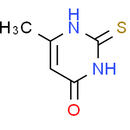Description
A-205804 is a potent and selective inhibitor of E-selectin and ICAM-1 expression with IC50 of 20 nM and 25 nM respectively.
Product information
CAS Number: 56-04-2
Molecular Weight: 142.18
Formula: C5H6N2OS
Synonym:
MTU
Chemical Name: 6-methyl-2-sulfanylidene-1,2,3,4-tetrahydropyrimidin-4-one
Smiles: CC1=CC(=O)NC(=S)N1
InChiKey: HWGBHCRJGXAGEU-UHFFFAOYSA-N
InChi: InChI=1S/C5H6N2OS/c1-3-2-4(8)7-5(9)6-3/h2H,1H3,(H2,6,7,8,9)
Technical Data
Appearance: Solid Power
Purity: ≥98% (or refer to the Certificate of Analysis)
Solubility: DMSO : ≥ 50 mg/mL (351.67 mM)
Shipping Condition: Shipped under ambient temperature as non-hazardous chemical or refer to Certificate of Analysis
Storage Condition: Dry, dark and -20 oC for 1 year or refer to the Certificate of Analysis.
Shelf Life: ≥12 months if stored properly.
Stock Solution Storage: 0 - 4 oC for 1 month or refer to the Certificate of Analysis.
Drug Formulation: To be determined
HS Tariff Code: 382200
How to use
In Vitro:
HUVECs are treated with various concentrations of MTU (0-20 μM) for 6 h after the addition of LPS (100 ng/mL) for 4 h. MTU inhibits LPS-mediated hyperpermeability in endothelial cells, with the optimal effect occurring at a concentration above 5 μM. The effects of MTU are examined on HUVEC actin cytoskeletal arrangement by immunofluorescence staining of HUVEC monolayers with F-actin labeled fluorescein phalloidin. Control HUVECs exhibit a random distribution of F-actin throughout the cells, with some localization of actin filament bundles at the cell boundaries. Barrier disruption by LPS (100 ng/mL) is manifested by the formation of paracellular gaps in HUVECs. In addition, post-treatment with MTU (10 or 20 μM) results in inhibited formation of LPS-induced paracellular gaps with the formation of dense F-actin rings. To test the cytotoxicity of MTU, cellular viability assays are performed in HUVECs treated with MTU for 24 h. At concentrations up to 20 μM, MTU does not affect cell viability.
In Vivo:
MTU treatment results in marked inhibition of the peritoneal leakage of dye induced by LPS. The average circulating blood volume for mice is 72 mL/kg. Because the average mouse weight in this study is 27 g, and the average blood volume is 2 mL, the injected MTU (142 or 284 μg/kg) results in a maximum concentration of 10 or 20 μM in the peripheral blood.
References:
- Ku SK, et al. Anti-inflammatory effects of methylthiouracil in vitro and in vivo. Toxicol Appl Pharmacol. 2015 Nov 1;288(3):374-86.
Products are for research use only. Not for human use.
Payment & Security
Your payment information is processed securely. We do not store credit card details nor have access to your credit card information.


